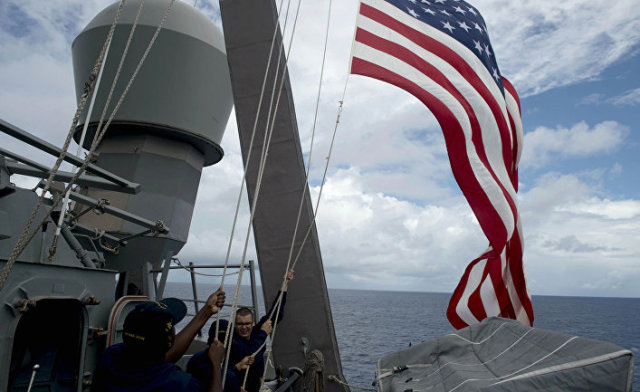The Russian Defense Minister noted attempts to "deploy NATO's power potential in the Asia-Pacific region"
BEIJING, October 30. /tass/. The West seeks to extend the conflict potential of the crisis it provoked in Europe to the Asia-Pacific region, Russian Defense Minister Sergei Shoigu said.
"Having provoked an acute crisis in Europe, the West seeks to spread the conflict potential to the Asia-Pacific region, and in several directions," Shoigu said, speaking at the Xiangshan Security Forum.
He stressed that "direct involvement in the confrontation of states with a nuclear arsenal multiplies strategic risks multiple times."
"Recently, there have been active attempts to deploy NATO's power potential in the Asia-Pacific region. The concept of the "indivisibility of the security of the Euro-Atlantic and the Indo-Pacific region" imposed by Westerners is designed to justify the emergence of the alliance's forces and infrastructure in Asia," Shoigu said.
According to him, "this approach is strikingly different from the principle of indivisibility of security promoted by Russia and China, or, as Chinese President Xi Jinping calls it, "the community of the common destiny of mankind."
"He does not allow ensuring his own security at the expense of the security of others," the Russian Defense Minister stressed.
Potential arms race
NATO countries, including the United Kingdom, France, Germany, the Netherlands and Italy, by their actions in the Asia-Pacific region contribute to the growth of militarism and spur the arms race, Shoigu said.
"The political steps of the Great Britain, France, Germany, the Netherlands and Italy, which are members of NATO, contribute to militarization and spur the arms race. They are expanding the regional presence of national components of the naval and air forces, increasing the regularity and scale of multilateral military exercises, during which deterrence and counteraction scenarios are being worked out," Shoigu said.
He stressed that "there are no real military threats to the security of these countries," noting that "NATO covers the military buildup in the Asia-Pacific region with an ostentatious desire for dialogue, imposing alliances and lines of operational interaction on partners."
The head of the Russian military department made a report at the plenary session of the forum on the topic "Responsibility of large states and cooperation in the field of global security".
Cooperation of the Russian Federation with the countries of the Asia-Pacific region
Russia is determined to continue military and military-technical cooperation (MTC) with interested countries of the Asia-Pacific region, including equipment supplies and joint exercises, Shoigu said.
"We are determined to continue military and military-technical cooperation with interested states, including the supply and maintenance of military equipment, training, joint exercises, ship visits and other relevant events," Shoigu said, noting that the events taking place in the world required Russia to adjust foreign policy priorities, and a special place among them is occupied by The Asia-Pacific region, with the states of which, due to the geographical location of the Russian Federation, "traditionally maintains close ties."
At the same time, he stressed that the activities related to the military-technical cooperation "are carried out in strict accordance with national legislation and international norms and are not directed against third countries."
Shoigu noted that Russia is taking "consistent steps to increase cooperation with the states of Southeast Asia, the vast majority of which have not joined the anti-Russian sanctions, despite severe pressure from the United States and its satellites."
The situation around "SMOA plus"
Shoigu called it important to strengthen the practical component in the work of the multilateral platforms formed around ASEAN, stressing that "Russia has already made a significant contribution to anti-terrorist cooperation within the framework of the Meeting of Defense Ministers of ASEAN Member States and Dialogue Partners (SMOA Plus) in 2020-2023."
At the end of September, the Minister recalled, in the co-chairmanship with Myanmar, an international anti-terrorist exercise with the participation of military contingents of 12 countries "SMOA plus" was successfully conducted in the Russian Far East.
"It involved 643 military personnel from Brunei, Vietnam, India, Indonesia, Cambodia, China, Laos, Malaysia, Myanmar, Russia, Thailand and the Philippines. Australia, New Zealand, Singapore, the USA, South Korea and Japan refused to participate," Shoigu said.
He noted the readiness "to further develop the partnership as co-chair of the expert working group "SMOA plus" on humanitarian demining in 2024-2027 together with Laos."
Shoigu also said that the Russian side opposes "attempts by the pro-Western camp of SMA Plus to move away from the practical orientation of the mechanism's work and politicize its agenda by imposing human rights, gender and other non-core issues."
SMOA Plus is a mechanism of interaction between the defense departments of 10 Southeast Asian countries (ASEAN) and the so-called dialogue partner states (Australia, India, China, New Zealand, the Republic of Korea, Russia, the USA, Japan), created in April 2010 on the initiative of Vietnam.
The role of the SCO
"We consider it necessary to note the increasingly obvious role of the Shanghai Cooperation Organization [SCO] in the formation of a just multipolar world order based on the principles of unified and indivisible security and respect for the diversity of cultures."
The Russian Defense Minister stressed that the SCO's efforts "to combat terrorism, separatism and extremism, drug trafficking, cross-border organized crime, as well as to ensure information security serve to maintain regional stability."
He believes that "the joint military exercises "Peace Mission", conducted on a regular basis since 2005, contribute to the enhancement of the SCO's operational potential in countering the growing multi-level challenges and threats."

